Thanksgiving just passed, which means it's nearing the end of the semester. My guess is most students have a massive research paper due within the next few weeks. Skip Wikipedia and get acquainted with JSTOR, a one-stop research database that can direct you to a bunch of relevant peer-reviewed materials for your topic.
Peer-reviewed is the operative word here; it means that a scholar's work was vetted by his or her colleagues and passes the field's standards for quality, accuracy, and credibility.
Wikipedia, conversely, while valuable, is an open resource, which means anyone can contribute information, with or without conducting extensive research on a given topic.
Peer-reviewed journal articles, academic books, and primary source material are considered scholarly resources, which are the only kinds that count when you are writing a university-level paper.
Do not hand in a paper that references information you found on Wikipedia, some guy's blog, and one of those websites with lots of blinking graphics and comic sans font.
JSTOR Basic Search JSTOR, which stands for "Journal Storage," is available through most schools' library websites. Universities and colleges have institutional subscriptions, which means students can access not only citations, but most of the journal articles themselves for free.
In other words, it'll save you many trips to the library.
[Click images throughout for bigger image of screenshots.]
If you are not redirected to the site through your university's library, sign up for your own account at jstor.org. Once you are signed in, you can run a general or advanced search, depending on how specific you want to get.Start with a Basic search. Assume I am working on a paper for my Urban History class. The professor assigned us to research the history of a specific aspect of city living. I've already thought over what topics I might want to write about: streets, parks, train stations, a city zoo.... All seem potentially interesting, but I'm not sure about which direction I want to take my paper until I've seen what information is out there.Now, there are more and less effective ways to tackle the preliminary research. Sure, I can type in "Urban History" if I want to sort through 437, 657 entries. However, if I have the idea to trace the rise of sidewalks in urban spaces, I can input the much more specific "urban history sidewalks," I get the entries back to a more manageable and immediately relevant 4,670.
Start Digging
I can also get more specific results by using the Advanced Search feature. You can limit the type of publication (journal, book, pamphlet, reviews, other), have it only include entries that you can immediately access online, and select specific disciplines (and journals within each field) to draw from.
Accessing An Article
If you are looking for primary source material as well, one option is to sort results Oldest to Newest. Remember - less recent articles can be approached as sources themselves. Now let's say I'm interested in doing something about sidewalks in an American city, and I come across this: I select the PDF and -BOOM!- there's your article, no trip to the library required! All that front matter is important - you need to cite that information if you reference the material in the paper. Since this particular example if from 1914, I would suggest treating it as a source, and look for more relevant scholarly literature offering analysis and arguments about the historical role of sidewalks in urban development.
Source-GUided Content Ultimately, you need to write a paper based on the information you DO have, not the evidence you wished you had. It's fine to start out with a particular thesis or hypothesis and then modify the paper's content to reflect what the sources suggest.
If you are writing a research paper, you need to engage with the sources to provide a compelling argument. Present material that confirms your own argument, but make sure to include the counterargument as well. Then, with additional evidence, address why you find the counterargument lacking. Other Research Databases JSTOR is not the only option, but I highlight it because it is easy to use and most institutions have a subscription. That being said, here are a few more general research databases:- Academic Search Premier / EBSCO
- PubMed
- ProQuest Dissertations and Theses
- ProQuest ERIC (Educational Resources Information Center)
- Google Scholar
- WorldCat
Keep in mind there are also databases specific to a certain field of study. If you are looking for information on archival documents available in Europe, you should spend less time on JSTOR and more time on something like the University of Wisconsin at Madison's Historical Research in Europe. Start broad, letting your initial findings help you zero in on a detailed topic. Then adjust your research strategy when necessary, using more field-specific databases.If you are unsure if your source counts, ask your professor or TA. In time you will learn how to differentiate a scholarly source from some guy's opinion.
My undergraduate school did not have Greek Life, but I know that joining a sorority or fraternity is a common option for many students. I asked my good friend, Danielle Sacks, to talk about how she found her way to Greek life. You can read more from Danielle over at The Birth of Athena, where she discusses powerlifting, feminism, and where the two often intersect. 4 Reasons You Should Give Greek Life a Chance When students arrive on a campus with fraternities and sororities, they are usually divided into two groups: Those who cannot wait to rush and those who would never, ever in a million years contemplate joining a Greek house. Very rarely, there are students who fall in middle ground - people willing to give Greek life a shot, but are not sure if it is for them.
I was certainly not one of those “middle ground” or pro-Greek Life students when I first went off to college. When I started college, I was staunchly opposed to joining a sorority. I mean, how could I even think about joining a house when I was so different from what I knew sorority women to be? TV, movies, and the news had painted a pretty bleak picture of Greek Life for me and that picture involved shallow, blonde women wearing pearls and preppy, pastel cardigans. I was not that - I wore dyed, black hair in an asymmetrical style, black motorcycle boots, and on many days, plain dark clothes. To top it all off, I was double-majoring in Physics and Science, Technology, and Society.
However, on the day that my roomie convinced me to go to an informal recruitment event under the pretense that I would be given “free food,” my view of Greek Life changed dramatically. I walked into the living room of my future house and was astounded by how “normal” everyone was. After talking with a few women and beginning to feel more comfortable, I met the lady who would eventually be my “Grandbig” in the house. She was wonderful and as we talked, I realized that she was a woman that I could truly see becoming my sister; she was funny, kind, smart, witty, and passionate. This admirable woman singlehandedly made me realize that all those stereotypes regarding Greek Life and sorority members were not necessarily true and it is, indeed, possible for smart, genuine, capable, strong, and passionate women to be a part of a house.
It was still a little bit of a surprise when I received my bid to my house, but the recruitment event had completely changed my mind about Greek Life. If those normal, smart, funny women were a part of a sorority, couldn’t I also be part of a sorority? It was that question that made me decide to give Greek Life a chance. I honestly believe that every student should give Greek Life a shot. Now, my personal anecdote may not have been very persuasive and I figured as much. I am also pretty sure that the usual “you will make friends and have fun!” route of attempting to convince people to join Greek Life is also not persuasive (because it didn’t work for me), so I have compiled a simple list of four reasons why I think Greek Life is great and why you should give try it out.
1. Not every house on every campus is the same This one may be obvious to you, but a lot of people treat all sororities and fraternities as if they are identical and that all members of Greek Life are the same (only to be identified by the color polo or cardi they are wearing that day). Let me just re-emphasize that every house is unique. Each fraternity or sorority has its own values, philanthropy, and system of governance and each chapter has its own flavor and set of unique members. Oftentimes, the culture of the campus influences the Greek houses on that campus more than anything else, and chances are, if you attend a more alternative school, Greek Life will tend to be more alternative to the norm. Or, on the other hand, if you attend a Southern or large state school, there is a possibility that the Greek Life on your campus will be more traditional. If you like your school, chances are, you will find a house on campus that you like as well.
2. If the idea of joining Greek Life gives you hives or makes you cringe, pledging a house will probably be good for you I am a firm believer that forcing yourself to interact with people whom you normally would not partake in activities with is good for you. You should regularly remove yourself from your comfort zone. This habit allows you to understand and relate to people whom, usually, you would not think twice about (or, on the other hand, allows you to understand and relate to people who, normally, would drive you bonkers). You will learn patience, compassion, understanding and, if you do it often enough, you will probably make some interesting friends. It is important for other aspects of your life (classes, jobs, and other community activities) that you develop the ability to make friends with (or, at the very least, be friendly with) people whom you normally would not gravitate toward. You will learn that more often than not, you actually have quite a bit in common and even people who scare you at first can be pretty cool.
3. Greek Life wiLL teach you valuable life skills One of the major challenges of going to college is learning how to use your time wisely. Many students struggle with this as they transition from living with their parents to living on campus. Learning to use your time wisely is a skill that hopefully all students learn before they graduate because it is definitely necessary in the “real world.” One of the best ways to adjust to your new life and develop this skill is to add in both structured (regular meetings) and unstructured activities so that you can learn to balance your hobbies and activities with your other responsibilities (classes, homework, labs, job, etc.). Greek Life offers both.
In addition to showing you how to balance your activities, Greek Life also helps you learn how to talk to people you don’t know. If you are anything like me, this is a skill you most certainly lack coming out of high school. Do you know how often you will utilize this skill in your life? ALL THE TIME. You will have to interact with people whom you do not know at every major and nonmajor life event - graduations, weddings, funerals, job interviews, customers, the doctor, the dentist, the hair salon, and people at the grocery store. Let me tell you: everything is made far more enjoyable if you know how to hold conversations with people you do not know. Otherwise, life is just one awkward adventure after another.
4. Greek Life will help you build your resume By the second semester of your senior year, you will panic. Why? Because you are about the enter the “real world” and that includes job hunting and with job hunting comes one of the most painstaking processes ever invented: resume writing. Want to make resume writing easier? Participate in Greek Life.
See, when you graduate, you will have a degree in something which symbolizes that you have learned some skills. With a Physics degree, I acquired skills like the ability to solve complex math problems, run and organize tests in a systematic fashion, and write long technical documents. Similarly, you may have a job or two (or three), whether on campus or off campus, during your college career. In addition to what you learned in your courses and labs, these jobs will add some more skills to your resume. However, even with these skills you have acquired over your four years, when you go to write your resume you will realize that it looks...short. You will most certainly need to add some extracurriculars to your schedule in order to fill out that entire one page document. Greek Life will not only allow you to expand your “Skills and Experience” section, but it will give you the opportunity to add an entirely new section to your resume: Leadership Experience.
Now, skills and experience are great (and necessary) to have on a resume, but leadership experience signifies something more to potential employers. It signifies a candidate who is willing to go above and beyond normal job duties; it signifies a person who is willing and capable of taking on additional responsibilities. Leadership experience will set you apart from other potential candidates and Greek Life is a perfect opportunity to gain that experience. On my own resume, I was able to add under “Leadership Experience” my positions of Recruitment Chair and Chief Administrative Officer and all of the duties that went along with those positions. Planning and coordinating recruitment events for 60 - 150 people, maintaining chapter bylaws and calendars, and recording minutes and attendance at all chapter meetings are no small tasks - and employers will take notice.
Just Give It a Chance I completely understand that at this point I have probably not convinced everyone (or even anyone) that Greek Life is for them. That is not what I am attempting to do; I don’t think Greek Life is for everyone, just like Physics Club isn’t for everyone. I do think, however, that more people should give it a fair chance because I honestly believe they would enjoy being a part of a house and the Greek Community. So, do yourself a favor and please rush (or attend informal recruitment events) and do so with an open mind. The worst that could happen is that you have a less than awesome time and only confirm what you had originally thought. Or, you could have an amazing time and wind up in a great house. At the very least, in the end, you will have a new experience; And hey, isn’t that what college is kind of is about?
9 ~ to ~ 5 Would you wear pajama pants to your job? Date your boss? Voluntarily work ahead at 2 am because you're up? College is society's permission to take four years (on average) to be a little selfish, so that you can figure out what you want to do afterwards. But it's not all frisbee-on-the-quad and rainbows, even while in school. I suggest approaching your time in school like it's a job, where you are self-motivated, look for opportunities for advancement, and dress the part.
By treating college like a job, you an maintain a healthy separation between your work and personal life, while taking care to approach the time and money you invest in a college education with a certain professionalism. “Without ambition one starts nothing. Without work one finishes nothing. The prize will not be sent to you. You have to win it.”
― Ralph Waldo Emerson Show Up Prepared We've discussed this. The number one way to make your professor like you is to show up, on time, with homework completed, and prepared to participate. The same way that you need to be at work, ready to contribute. The classroom environment is way more team-oriented, like most offices, than it seems at first glance. Instructors depend on the students to get their work done, so that they can move through the curriculum at a reasonable pace. When students skip doing the reading for class or "forget" to do their homework, they slow the entire class's progress. 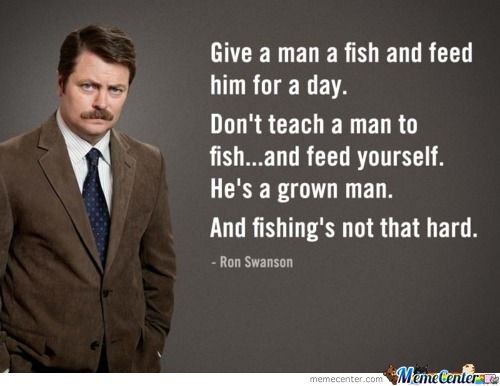 Ron Swanson is the best, but his words here do NOT apply to either the classroom or office setting. Dress The Part Now, I'm not asking you to put on a tux for Intro to Psychology. But I am imploring you to take five seconds to change out of the pants you slept in favor of jeans. Dresses are excellent options as well - it's a complete outfit to just throw on and go.
I don't care if everyone else is walking around in their pajama bottoms and a messy side-ponytail. I don't care if you want to be "comfortable." As a sign of respect for your instructor, put on non-elastic waist pants, run a brush (or at least your fingers) through your hair, and leave your slippers at home.
I realize there are some professors who dress like slobs. They are the exception. Most wear tailored blazers, trousers, and dresses because they are at work. And when you're in the classroom, you're at work too. So dress accordingly.
Be Careful Who You Date It goes without saying (gosh, I hope it goes without saying) - DO NOT DATE YOUR PROFESSOR. Do not attempt to date your professor. Do not ask your professor out. Do not respond to your professor's romantic overtures (that's called harassment, not romance, and needs to be reported).
Same goes for T.A.'s. Off limits, people.
Now, here's a trickier question: should you date classmates? It's natural that you will meet and want to date other students, but think carefully before you jump into something with that guy who, like you, is also the rare combination of an Engineering major and Japanese minor. You're going to be seeing him in every class from now until graduation, so make sure that's something you can handle if the relationship sours.
Personally, I resolved to never date someone while taking the same class. I broke my rule ONE TIME because the guy insisted we were meant to be more than friends. He was wrong (very wrong). I was sick of him after, like, 10 days, and still had a semester to go of being forced to share a room with him for 2 hours twice a week.
I didn't date any more classmates after that.
Establish Work Hours My first year as a grad student, I worked harder than I ever had in my life. I left my house early in the morning, studied between classes in the hallway, and then did my homework in the library until it was dark out. I also had trouble sleeping, and spent my extra time awake doing more work. I worked on the weekends, because "it's not like there's anything else to do."Wrong. (Wrong, Wrong, WRONG.)I wasn't sleeping at night because I was overworked. So working when I couldn't sleep was only making it worse. There was plenty to do on weekends; I just failed to prioritize socializing. There was no reason for me to camp out in the library for hours after finishing a day's worth of classes.I'm telling you right now: not only do you deserve to have a clear separation between your school work and your personal life - it's essential that you do so.Here are two maxims I belatedly implemented:1. Minimum Effort for Maximum Output- If the class is an easy A, don't do anymore than you have to. This way you conserve your energy for your more challenging classes, and free up time to do other things outside of school work.
2. Perfectionism is the Enemy of Getting Stuff Done- My undergrad advisor saw me struggling to write the Most Perfect Undergraduate History Thesis Ever and noted, "Sometimes something needs to be just good enough in order to be done.
Wise words. Also, apparently he wrote his books according to this philosophy, so it works. Know Your Strengths If your handwriting is so amazing people think it should be its own font, raise your hand when the professor asks for a volunteer to write discussion points on the board.
If you have a booming voice, be the person who gets everyone's attention when your mouse-voiced instructor is failing to so.
It you know everything there is to know about computers, help your classmates get their PowerPoint presentations set up prior to class.
Same as any environment, you want to distinguish yourself as a valuable member of the group, both to your professor (boss) and fellow classmates (co-workers).
Own Your Weaknesses I'm not talking about "caring too much," "working too hard," or "being a bit of a perfectionist."
If you know that philosophy or Greek mythology or Advanced Spanish is your academic Achilles heel, seek out help. If it's more of a skill - public speaking, writing, or leading your peers - look for assistance through on-campus clubs and organizations where you can practice strengthening your weak spots.
Remember You Are More Than The Job Whether you are in currently in college or out in the working world, know that you are more than your professional identity. You deserve to have a social life outside of and apart from your work life. And - most importantly - you have to define those boundaries for yourself; you are the only person who knows how much work needs to come before play.
Treat college like a job to keep yourself invested in your academic success, without confusing your professional objectives with your life's purpose.
straight from the gatekeeper... Recently, I met with the Director of Admissions at a local private university, known for its liberal arts program and gorgeous campus. She gave me insight into what an admissions counselor is looking for in prospective students, as well as an alternative way to thinking about school acceptance rates. It turns out, schools aren't necessarily looking for the "well-rounded" student, and you, in turn, may not want to attend the school with the 14% acceptance rate. IT'S not about the longest resume I asked: "As an Admissions Counselor, would you rather see a student who is well-rounded, in the sense that he plays a varsity sport, is a leader in a bunch of clubs, studies German, and is a proficient violinist - OR - would you prefer to see a student choose one activity, like art, and pursue it consistently over several years?"
She replied that it depends. Of course they want to see students doing both - demonstrating commitment to a certain passion, while participating in the full scope of extracurricular activities offered to high school students.
Ultimately, however, she emphasized accepting an applicant comes down to if the student is prepared to succeed at her school. Does the student's grades, test scores, letters of recommendation, and essay provide a composite sketch of the applicant's preparedness, including emotional maturity, to be successful at the university-level? reconsider how you look at acceptance rates Similarly, she suggested reframing how you approach acceptance rates when weighing the relative value of a particular school. They accept 80+% regularly because 80% of the applicants were prepared to be successful and the school had the capacity to accommodate all who qualified.
Think about it: if a school is turning down qualified applicants left and right, you are about to enter a VERY competitive atmosphere. If you thrive on perceived competition, you stand to do well in this environment.
However, if you are someone who doesn't want to feel like you have something to prove from Day One, you might be more comfortable at a college with a higher acceptance rate. visit prospective schools before applying Sometimes you can just feel if a school is right - or completely wrong - by walking on campus. It's absolutely worth the time and money to arrange a meeting with an admissions representative to hear about what the school has to offer you. Yes, you are trying to impress them, but remember - they are also concerned with winning great students to attend their school.
You can do campus tours, meetings with financial aid representatives, and even set up an overnight visit with current students. I remember doing a visit at Colgate University. The sophomore assigned to babysit me was fantastic, and her enthusiasm for the school was evident. Heck, I loved Colgate! But I did not love its location in rural upstate New York; something about the campus felt too isolated for me. And I never would have known if I hadn't been there in person. It's no wizard of oz Admissions representatives are real people who are dedicated to initiating and building relationships with prospective students and their families. They want applicants who demonstrate a readiness to succeed in particular university environments, and are a resource for those students who are undecided whether or not they should apply.
And admissions counselors, like other educators, derive enormous satisfaction from playing a role in helping further a student's academic and professional goals.
From Left to Write asks reviewers to connect the book of the month with their personal experiences. Accordingly, this is not a traditional book review, but rather, my response to this month’s selection. Find out more here. I received an advance copy of Buddy: How a Rooster Made Me a Family Man for free, but I was not compensated in any way for this review. My comments are my own. This book is available for purchase here. ANIMALS ARE THE BEST Brian McGrory's Buddy: How a Rooster Made Me a Family Man made me cry twice: once over a dog's untimely death, and once over a rooster's loneliness. I guarantee that if I had read this book five years ago, I would have scoffed, pronounced everyone in the book ridiculous, and tossed the book aside mid-way through. But that was before George, the cat who turned me into an "animal person."McGrory describes his dog, Harry, as that once-in-a-lifetime perfect pet, who you connect with instantly and are irrationally (and sometimes unreasonably) devoted to.Growing up, I thought I preferred dogs. But when they got too close, it turned out I liked them best when they were in another person's house. Or safely on TV. They were just kind of...messy. The little ones were yappy and insistent, while the big ones licked your knees and got hair all over your nice clothes. No thank you.But, of all God's creatures, I reserved a special kind of loathing for cats. I wasn't raised around any cats, and neither of my parents were especially fond of them. So I parroted what I heard about cats being disgusting little poopy-pawed monsters who walked in their litter box, onto your kitchen table, and sometimes across your face when you were sleeping. They made your whole house smell like cat pee.It wasn't until I wasn't 25 I began to reconsider my opinion on cats. My friend had a cat and maintained a lovely, wonderfully-smelling apartment. Her cat, Charlie, was a kind-hearted plump orange tabby who was extremely respectful of people's personal space and well-trained. After my husband and I moved to Tacoma and I found myself working long hours alone in my home office, I started to think about a cat. My husband already had a dog, who was currently living with his dog-grandparents until we could get him back. One afternoon, I confessed that I had been thinking about a cat. "Can we just go look," I asked. My husband agreed, confused where his cat-hating wife went.Of course, we ended up at a Petsmart that was hosting the Pierce County Animal Welfare's cat rescue. So just looking turned into just holding one or two, and then I met this little Angel-Face: His name was George, which seemed to fit. For the very first time in my life, I had an immediate and powerful connection to an animal. I was on my way to becoming a cat lady.
We took George home and got him set up in the guest room. He was bold, hilarious, vocal when hungry, and excellent entertainment in the mornings. He had a personal vendetta against my husband's boots: When we got our dog, Mercury, back, poor Merc just wanted to lick George's face. George had never seen a dog. I made the poor decision to introduce them while holding George. I didn't know you are supposed to hold the dog and let the cat run. I still have scars from George's hissy fit.
Of course, a month later they were BFF's. Meanwhile, I started volunteering with the same cat rescue where I found George. Every weekend I went to talk cats with other volunteers, and took joy in connecting families with the right kitten for their home.
I started researching cat behavior to find answers to the Mysteries of George: Why does he drink out of my water glass? Why does he love chasing lasers? Why does he chirp when he sees a bug or a bird he wants to kill? Why does he burrow under blankets? One of the worst moments of my life was the day I turned my back for ONE SECOND and heard a kitchen stool crash over. George was crumpled in a ball, holding his back leg at a strange angle. He wouldn't let me near him and made a horrible mewling noise. I called the vet in hysterical tears, envisioning George needing an amputation, too much anesthesia...dying. I couldn't bear the thought of anything happening to this goofy cat.
(Turned out he was totally fine.)
George turned me from a cat-loathing, animal-snubbing, mess-intolerant person to an animal advocate, special friend of cats, and someone who will take a little (or lot) of fur on my clothes any day in exchange for the happiness my pets give me.
George was my gateway cat; now I want ALL THE CATS.
I compromised with my husband and we took in one more, Gloria, this past June, a year after bringing George home. George assumed the role of Gloria's mother instantly. The relationship people have with their pets might be the most loving of any. It's so uncomplicated. They just love you, in the most generous way.
I'm fairly certain that most people would benefit from having a pet. I know it taught me a lot about my capacity to love something that depends so wholly on you. It's not draining or taxing or tiresome. It's actually kind of the best thing ever.
What do you think about this? Some claim that the traditional college education is on its way out. They argue people can build their own curriculum with YouTube videos, online courses, and look up information on Wikipedia.
I agree that there are problems. The cost of college is unnecessarily inflated, sometimes for no other reason than for one school to preserve its ultra-competitive image. Some schools are becoming degree mills, where even C's and D's get you a bachelor's, diminishing the value of the degree overall. And there are definitely other ways to pursue your professional objectives, with or without first going to college.
However, the decentralization of information and the traditional college experience are by no means mutually exclusive. Rather, it's a move to what academia is supposed to be about: a democratic exchange of knowledge, where scholarly resources are openly shared. CONVERSATIONS: Why We Won't Need College In 15 YearsFine, but we will still want college in 15 years.A Day In The Life of a Business School StudentConsidering business school?
The "Transfer Moment"It's becoming increasingly popular for students to start at a community college.ACT Scores By StateTable of average ACT scores across the country.Academic Advisors and the Wizard of OzA trip to your advisor may help you realize the strengths you had all along.
Ultimate Airport Dining GuideTraveling home for Thanksgiving? Here's a list of some of the best airport food.
Ow, My Heart As a younger, more sensitive undergraduate student, I did not handle bad marks or negative feedback well, even when the person correcting me did so in a kind and instructive manner.
As you can imagine, when someone skipped any deference to feelings or, you know, human decency and civility, I felt like I had been punched in the gut.
Fortunately, once junior year arrived I was feeling more confident as a student. Having completed all my required credits in disciplines I am not talented in (Calculus, Physics, Philosophy), I was able to concentrate on History and Russian, where it was much easier for me to achieve higher grades.
Until - HER.
Everyone will have this instructor at least once in their academic lives. The professor who you think has some kind of personal vendetta against you and reserves a red pen just for your work.
In my case, it was a Japanese history course and Professor T. ate students like me for breakfast. Actually, she had an appetite for crushing pretty much any student.
In class she would ask pointed questions about the 800 pages of reading we had two days to complete. Things like, "And what did the author say about how the Emperor was dressed for his meeting?"
We'd all be quiet. Nobody had thought to take notes on the Emperor's clothes.
She'd scan the room, looking for the most skittish-looking student. Sometimes it was me. Other times, it would be someone else. The rest of us would look on, horrified at what was unfolding, but also incredibly relieved she was picking on someone else at that moment.
The worst was when she would ask someone a question, let them ramble an answer, offer no indication if the student was correct, and then - then! - sometimes ask a follow-up question to intentionally have the student dig himself in a deeper hole of WRONG.
And then she pounced: "Hmm. Is that what happened?"
(The rest of us sat there thinking, um...you're the professor. You tell us.)
Then, to finish off her exercise in humiliation she would pick another student to answer, to underscore how very WRONG the first student was.
I found two things comforting. First, she didn't dislike me in particular. Just stupid students. And since none of us were as intelligent as she was (because, hello, we were a bunch of 20-year-olds!), she found each of us equally worthy of her disdain.
Second, she was kind of...special. I remember sitting in class, waiting for Professor T. to arrive. Someone observed hopefully, "We were supposed to start five minutes ago. Do you think class is cancelled?!"
Another student, who had just walked in, saying, "No, I just saw her on my way inside. She was talking to a squirrel."
So this is who we were dealing with, people. SPIRALING DOWNWARD... Oh, good. You decided to rewrite you paper. I'm so glad; the other one was just getting worse and worse. Spiraling downward. I was reading it and thinking, "Oh. dear." I look forward to reading your next draft. Professor T. was super talented in the art of the backhanded compliment. She had a rule that any paper you wrote during the semester could be rewritten and resubmitted as many times as you wanted. Sounds great, but it's actually the worst. First, professors seem to grade harder when they are congratulating themselves on being so magnanimous in letting you raise your C to a B- with a rewrite. Second, your paper is Never. Done. You're in the middle of rewriting your first, but now a second one is due. The worst criticism I ever received was on a paper about Emperor Hirohito. That's all I remember about it; I've blacked out anything more about the assignment. But I recall working on this paper through three drafts, which Professor T. would take, dump a bucket a red ink on, and send it back. The comments in the margins were mainly, "What are you referring to?", "What does 'it' mean here?", "Who are you talking about?", and above all, "Be more specific!"Finally, I scrapped the whole paper, and wrote on an entirely different subject. When I handed it in, she gave me the "spiraling downward" line in front of the ENTIRE CLASS, and I went back to my room to cry and worry and doubt my ability to write another paper or do well in her class or even graduate, because clearly I had just been discovered to be a complete moron devoid of any real skill or talent.I know this sounds dramatic. Part of it was my own Impostor Syndrome kicking in, and part of it was a professor who didn't recognize and take steps to bridge the gap between her 30-some years as a scholar and our three as undergraduates.
I'm Glad It Happened I had nightmares about this class even after it was over. I swore I'd never take another Japanese History class at Notre Dame. I never wanted to see her again if I could help it.However, her criticism of my paper continued to ring in my head. I started reviewing my papers for clarity by pretending she was reading it. What do I mean by "it" here? I'd replace a vague pronoun with a specific person or idea. I stopped using passive voice when possible, became meticulous about footnoting information, and above all, was as specific as possible while skipping the fluff and filler.
My writing dramatically improved after her class.
Today, when I edit a student's paper, my most frequent comments are Avoid vague language - what do you mean here? and Be more specific. I just skip her preferred method of using humiliation as a pedagogical tool.
I didn't escape her, by the way. I was selected for the Honors program, which came with a required research class. Guess who was the teacher?
Except this time I was prepared for Professor T. My grades were decent, now that I understood what she looked for in a paper. Meanwhile, I reassured my classmates who were experiencing her for the first time to hang in there.In the end, her criticism stuck with me as the worst I have ever received because of her delivery. But her points were valid. For me, it was almost necessary to have someone do that to me early on in my academic career. I learned how to separate the critique from the criticizer, and more importantly, my self-worth from my work.I'm not quite ready to thank Professor T. But I am grateful that she helped me improve my writing, while showing me how NOT to treat students.
Recognize Any Of These? I've attended every type of school at some point: public school, a co-ed secular private school, a public Catholic school (a.k.a. why my father loves Canada), a private all-girls Catholic school, and a co-ed private Catholic university.
Notre Dame, like many religiously affiliated universities, doesn't actually require its students to be Catholic. There are plenty of other reasons students might want to go to a school that operates under the banner of a specific creed: location, sports, a unique program, and so on.
If you're considering a Catholic school, here's a list of things that are totally normal parts of campus life. And if you went to a Catholic college, I'm sure you'll recognize most of these. You Call Some of Your Professors "Father" This is one time when you referring to your professor as "Father" isn't some weird kind of Freudian slip; plenty of instructors at a Catholic university are priests.
Oh, and you live with them too. Priests and nuns often oversee dorms, living in a cozy first-floor suite and valiantly tuning out some of the college-age drama unfolding around them.
My favorite priest-teacher was an art professor I had, Father Martin. I took a Drawing class with my roommate, where we were treated to his unorthodox approach to art. For the first two weeks we weren't even allowed to open our eyes when drawing.
Then we had to hold our pencils like wands, making little marks instead of lines: "Imagine your pencil is a teeny, tiny ant, crawling across the page," Father Martin instructed.
Father Martin was awesome. You Know An Aspiring Nun Or Priest You're taking classes and hanging out with a guy just like you, except that he's dating Jesus Christ. Young women and men who are considering the religious life are well-integrated into normal student life, showing up at football games and parties. This is for good reason; most orders want young people to be absolutely sure about their call to the priesthood or sisterhood. So they are encouraged to have as much of a traditional college experience as anyone else. Fish Fridays During Lent (i.e. the 40 days leading up to Easter), Catholics are supposed to refrain from eating meat on Fridays. Some Catholics skip meat on Fridays year-round. Some say, eh, whatever, and eat meat when they want with impunity.
Except - oh, snap! - your school's not going to give you the option. Fridays in the dining halls were a choice of fish or fish, with some pasta. Dating Is...Weird. Let's have a really honest moment here: dating is super weird at a Catholic school. There are two extremes - either people are just looking to hook up OR one date freshman year turns into a four-year relationship, a "ring by spring" your senior year, and a wedding the summer after graduating.
I actually think it makes perfect sense so many people find the person they want to spend their lives with during college. You're in a place where many people share the same upbringing, ambitions, and value system you operate under.
That being said, I ran fast and far when I sensed someone was looking to wife me after one dinner at the Olive Garden. Jesus Is Watching You Learn, Eat, Sleep... Crucifixes everywhere! In the dining hall, classrooms, and dorms. At first it's a little strange eating your spaghetti directly across from the life-sized likeliness of Christ, but then you get used to it.
I should mention, in all seriousness, that there's something nice about an atmosphere where students can pray openly before a meal, a football game, or even a test. Mass AnYtime, AnyWhere: Pajamas Optional Mass is almost a social event, and it's not uncommon students to go more than once a week. Services are held in dorm chapels across campus morning, noon, and night, and anyone is welcome.
Our dorm's rectress, Sister C, had a little dog who used to pace in front of the alter, snorting and scurrying at the priest's feet as he delivered the homily.
Plenty of people showed up in their pajamas, along with their boyfriends since here mass counts as a date.
Then after mass everyone adjourns to the basement to eat cake and ice cream.
So, really, these will be the best mass experiences of your life. You can wear elastic-waist pants, sit on the floor, and expect snacks afterwards. No Drinking Allowed...Except BehinD Closed Doors This isn't necessarily unique to a Catholic school, but the rule was no drinking under age 21, no transporting alcohol in plain site, and no public consumption of alcohol on campus.
So, everyone drank in their dorm rooms with beer they'd smuggled in a backpack from the parking lot.
In other words, the real rule was, "Don't Get Caught." People Who Are Annoyed By How Catholic The Catholic University Is Because most Catholic universities actively pursue a diverse student body, a good number of students aren't Catholic. While most understand that it is a) their choice to participate (or not) in Catholic practices on campus and b) they are allowed and even encouraged to host their own services, clubs, and events honoring their beliefs, there is always that guy who complains about how Catholic everything is.
I'm just going to state the obvious here: you knowingly applied to and enrolled in a Catholic university. So, expect and accept that some Catholicky things are going to happen. Just One Of Many Options As I mentioned, I've been to every type of school, so I'm not pushing one over another. Instead, I wanted to highlight some of the quirks, advantages, and potential disadvantages to attending a Catholic university for those who are considering applying.
Just remember: many non-Catholic students have a great time at a Catholic university, while some Catholic students want to go elsewhere. That's fine. Figure out what's important to you in a school and apply somewhere that has all the academic and social outlets you think you need - Catholic or not.
Happy Veterans Day!
Take a minute to look at misconceptions about Grad Warriors, Freedom of Speech (or, rather, Freedom of Tweets), and how to be your own champion: We know that our thoughts influence actions. Why do we need to say that negative self-talk to ourselves? We need to get our own self-affirmations." 21. Realizing that you are not perfect, that no one else is, and that it should never be your goal. The more you compare yourself to people you think are happier or more successful, the more you turn them into characters and not human beings. Every single person you pass on the street is real and has their own story, and their own flaws. Remembering that they’re struggling, too is the quickest way to make yourself a better person.
Do you know how to treat a coffee stain? Open a checking account? Change a tire? Be a decent human being to any roommate who may be thrown your way?
Maybe you know all of these things already, in which case, I apologize for being overly pedantic. Meanwhile, I freely admit to you, my clients, my mom, and most of all, to myself, that I sure as heck didn't. I figured them out over my first year, but still, I wish I had been more prepared for some of college-life's essential skills outside of the classroom. Fortunately, there's plenty of people willing to show you or, if you can't bear to reveal you don't know how to work the dryer, lots of online sources to guide you. 1. Laundry There are some young people out there who have others doing their laundry for them until the day they arrive at college. I was not one of these privileged elite; my mother had all of us, even my younger brother, trained in doing our own loads. And can you blame her? Laundry is annoying. But it's worth it, since there are few joys greater in life than the rejuvenating effects of clean sheet day.So, in terms of laundry, make sure you know how to:- How to operate a washing machine and dryer
- The settings for washing and drying your clothes and linens
- Attend to stains
- Change your linens reasonably often (i.e. more than once a semester)
Sometimes it is an option for students to have their laundry sent out. Look, I'm not trying to be all judgey but...I'm just going to go ahead and be judgey. Unless you are taking seven classes a semester, play a varsity sport, and are president of your fraternity, you can find the time to do your own damn laundry. You've got to learn sometime. 2. Finances I didn't realize it at the time, but I had the most amazing 5th grade teacher. Mrs. Null gave us all fake checkbooks at the beginning of the school year. We learned how to fill out checks, submitting payments for candy and prizes after we earned Null-Bucks (the most valuable currency as far as Kings Elementary School students were concerned). We had to track our expenditures and income for the entire year.
So I entered college understanding how to balance a checkbook. But then all banking went online, and I'm concerned that students no longer have to confront withdrawals in that active way balancing a checkbook requires. So my suggestion is to play an active role in your spending. Make a budget, understand things like interest rates and overdraft penalties, and know how much disposable income you actually have (if any).
Beware of credit cards. If your parents give you one for an emergency, make sure everybody agrees what constitutes an emergency. Just say no to stores who want you to open up a card. Now's not the best time to be juggling multiple lines of credit. And they know that, people! These are predatory measures by stores hoping to rope young people into a cycle of never-ending high-interest payments. 3. Recognize and Treat Illness When you're still living at home and in high school, you are used to relying on external confirmation that you are, indeed, ill enough to skip class. In college that's a personal call. Obviously the professor is going to roll her eyes at any student who lets a sniffle stop them from showing up every other Friday, but it is certainly acceptable to stay home when you have a contagious illness with debilitating symptoms.
I'm not going to try and talk you into going to class when you've been puking all morning from the flu. You need to rest and recover, and yes, even walking seven minutes across campus to sit in a 75 minute lecture might be more than your body can handle. Plus, you don't want to spread the illness to others.
Understand that if you're sick, you are allowed to stay in bed, and should contact Health Services if you get to a point where you cannot take care of yourself.
Don't the same mistake I did, trying to push through. I only ended up delaying my recovery. It wasn't like I was making slam dunks in class when I was barely keeping my eyes open and my barfiness contained.
4. BeING a Good RoommATE I've been incredibly lucky in that I've had mainly exceptional roommates, who understood how to respect each other's space and possessions. It helped, however, that I lived with friends. But what happens if you are a freshman, assigned to live with someone you've never met before? Here's a couple of habits I advise implementing early on:- Take turns tending to the garbage so it doesn't become a passive-aggressive game of balancing granola bar wrappers on a tenuous Mount Crap
- Headphones, unless you find someone who has the exact same musical preferences as you when you're both in the room (ask before blasting music)
- Be in charge of your own schedule. It's not your roommate's fault that you slept through your alarm and he didn't come back after breakfast to make sure you are up
- Ask before bringing friends, dates, or significant others to hang out in the room for more than an hour
- And definitely ask before having friends, dates, or significant others sleep over in the room
- Those aren't your clothes / shoes / stapler / Funyans. So don't take them without asking
It's nice, but not mandatory to offer:- You will be in charge of vacuuming (or some other chore you don't mind assuming as yours)
- You can set up a backup alarm on your phone if your roommate is worried about sleeping through his before a big test
- You can let your friend and her boyfriend have the room from 9 to midnight to watch a movie, since you know how difficult it is for them to have alone time on campus
- Tell your roommates that the snacks you bought for midterm week are communal and people are free to help themselves
In other words, in the scenario where you are just trying to get along, concentrate on respecting the other people's space and belongings. In a more friendly environment, consider ways you can contribute to your roommates' happiness and comfort. 5. Car MAINTENANCE and Travel Alternatives I didn't have a car during my undergrad or master's programs, but the people who did seemed to have a real headache on their hands. Cars break down and need costly repairs. Gas money. Flat tires. People always asking for rides to the airport at 5 am on a Thursday. Blizzards requiring you to dig out the vehicle with your hands because the ice scraper is locked in the car buried under the snow.
If you don't have a car, make sure you know how to navigate the local city transportation. Buses are rarely (if ever) my preferred mode of transportation, but they are inexpensive and semi-reliable. The subway is slightly better. Trains or light-rails now run through major cities to help keep traffic down. Typically there are student rates, but fares are generally low already. Buy month-long passes to save.
You could do what I did when I was going to school in Boston, and just walk. I was trying to save money and avoid crowds. Unfortunately that meant walking 5 miles round-trip in rain or snow or extreme heat.
I wasn't able to afford my first car (well, to lease a car) until I was 24. Honestly, I had to re-learn how to pump gas, work the headlights, and figure out how and when to take the car in for maintenance. I could still parallel park with ease, however, which was an odd thing to have stick with me.
Make sure when you are taking a car to school you know the parking situation and related costs, where to take the car if there is a problem, how to fix a flat tire, and how to say no if there's that one guy expecting rides all over town. Or to at least ask for gas money. 6. How To EMail And Make A Phone Call Nope, not a joke. There is an immense technology gap between today's students and the people are they interacting with in the academic and professional realms. Texting is the most common form of communication among young adults. The problem is, you can't text a professor or your employer (in most cases).
Make sure you understand how to send a well-written email to your instructor, that has fundamental elements of etiquette, such as a greeting and farewell. If it's long, use paragraphs. Skip "abbrevs" and emoticons. You aren't texting your friend to see if she wants to get fro-yo in the DH before watching HIMYM (who just understood all that?).
And when you need to handle something that requires a real-time conversation, pick up the phone and call.
It took me a while to get over my phone phobia. Even now I prefer email infinitely to picking up the phone. But I had to get over it some years ago because the majority of people who were older than me by five years or more wanted a phone call when we needed to touch base. Catching Up Ultimately, the list of what you need to know before arriving to college is going to differ from person to person. Maybe you already knew all these things, in which case, you're ahead of the curve. And if you just realized you have a lot to learn, there's plenty of time to catch up.
You'll be fine. Just make sure you know how to get yourself to class, use a phone beyond texting, get yourself to the doctor, keep your clothes clean, and remember to eat a vegetable every once in a while.
|

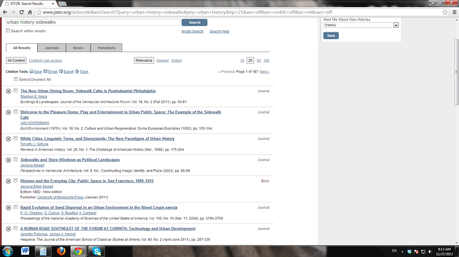




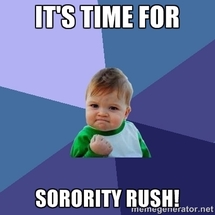

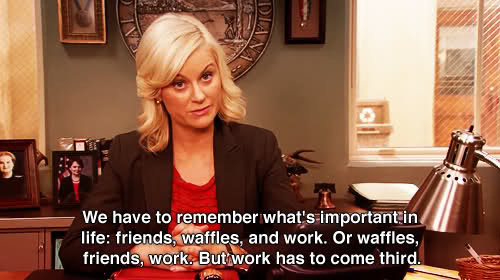



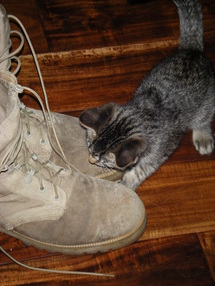












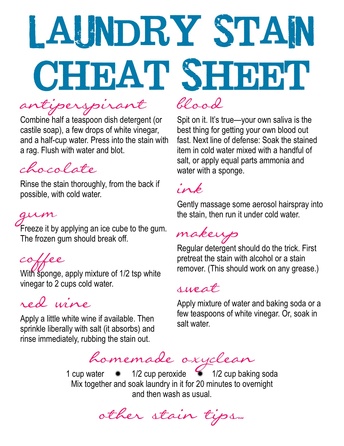


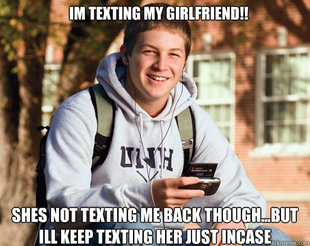


 RSS Feed
RSS Feed